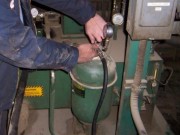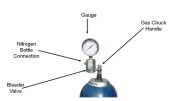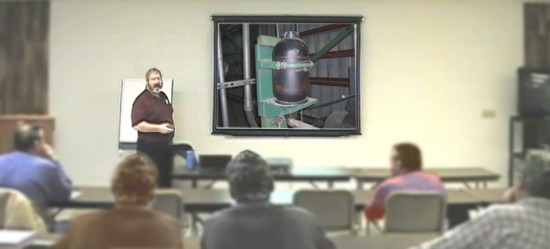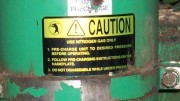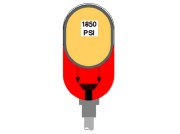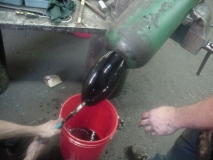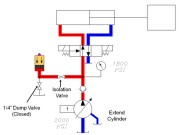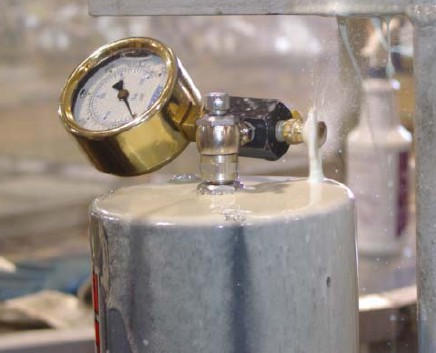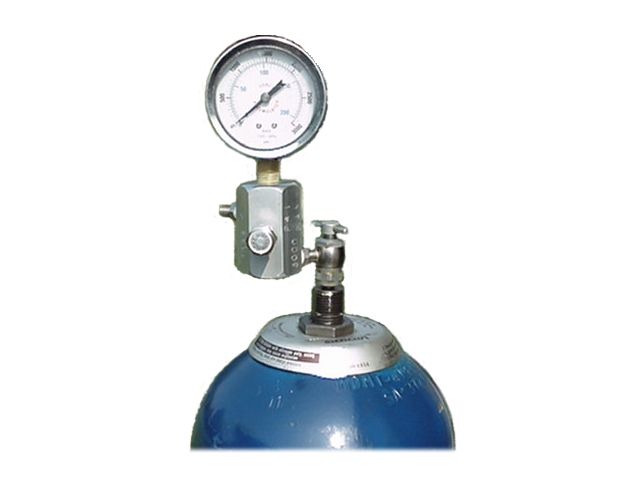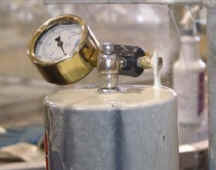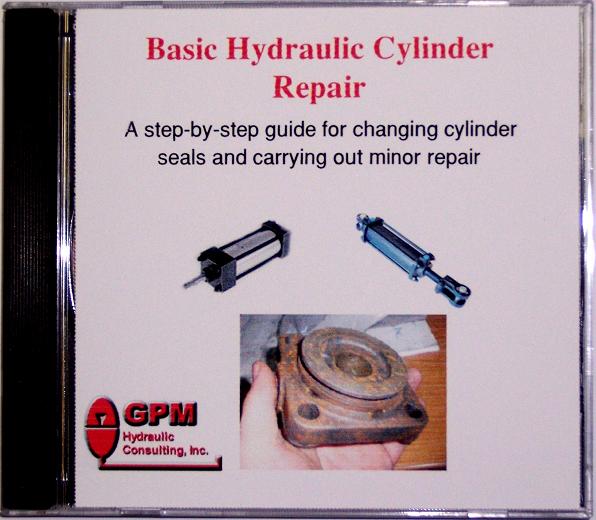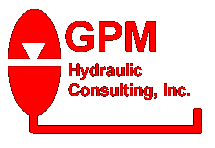
P.O. Box 1376
Monroe, GA 30656
(770) 267-3787 gpm@gpmhydraulic.com
For an archive of past newsletters, please visit:
http://www.GPMHydraulic.com/newsletter_archive/
CLICK HERE to send this newsletter to a friend!
|
'Troubleshooting Hydraulics' Newsletter |
||||
|
||||
|
In This Issue |
||||
| 1.
GPM Exclusive Webinars! Scheduled for April
2. Are Hydraulics Costing You Money? 3. What You Don't Know About Hydraulic Accumulators Can KILL You! ***NEW!*** Accumulator Safety DVD 4. Can I Use Multi-Viscosity Oil in my Hydraulic Machine? 5. Call GPM for Emergency Hydraulic Troubleshooting 6. 2009 Public Maintenance Hydraulic Troubleshooting Workshop Schedule 7. 2009 One-Day Troubleshooting Hydraulic Pumps and Accumulators Workshop Schedule |
April 29th
 By Alan Dellinger
By Alan DellingerThere is no doubt about it. HYDRAULICS COST YOU MONEY. That is, when they are not properly taken care of.
I like to think of a hydraulic system as being very much like the human body. If we donít take care of ourselves, we donít operate very well. When our blood is contaminated, arteries and valves start to clog and if our blood pressure is too high we overheat. These two elements alone can cause major downtime for us. But, with blood testing and an occasional visit to the doctor we catch certain problems as they arise. Letís face it, we are all getting older and with age new problems will most likely pop up. But, by getting checked out every now and then we can catch these problems before they get worse.
Think of your hydraulic systems as
individuals and you are the doctors. Now, keeping this in mind would you
let any old Joe the plumber take your temperature, give you a physical,
draw your blood or work on your heart? I think everyoneís answer
to that question is the same, NO. And unfortunately, many maintenance
personnel are not qualified to perform the proper preventive maintenance
on their equipment either.
|
The difference is simple - oil serves a different purpose in a car or truck engine than it does in an industrial machine. In your car engine, the oil is used exclusively for lubrication. In an industrial hydraulic machine, the oil serves no fewer than four functions:
- To transmit energy
- As a coolant
- For internal lubrication
- As a sealant
This makes multiple viscosity hydraulic oils (oils with the designation MV, MW, MG or HVI) patently unsuitable for industrial machines. While there is a valid argument for their use in mobile equipment, we beg to differ. Here's why. First, many multi viscosity oils have detergent additives. Detergents tend to cause foaming in the oil which causes the pump to aerate and results in damage. So how do you keep the inside of the machine clean without detergents? Regular system flushing, not some "snake oil" additive.
The reason multi-viscosity oils are used in car and truck engines is so they will maintain a relatively constant viscosity at different temperatures. Polymers are added to light weight oil. When the oil is cold, the polymers are extended and do not have an appreciable effect on the viscosity. As the oil heats, the polymers "coil up" and make it harder for the oil to travel through an orifice, artificially increasing the viscosity and maintaining lubricating properties of a heavier weight oil. In other words, if your car had an oil heater in its oil pan as an industrial machine does, there would be no need for multi-viscosity oil.
Since hydraulic oil is used to transfer power as well as lubricate, a multiple viscosity oil (which is really a light weight oil with additives) would break down much faster than oil of the recommended weight. This same low weight oil will be less effective as a sealant or coolant. Hydraulic machines rely heavily on the oil to carry excess heat to the reservoir where it can be dissipated to the atmosphere. Low viscosity oil becomes saturated with heat very quickly.
Finally, the sealing properties of a low viscosity oil leave a lot to be desired. Multi-viscosity oil will leak much more readily from fittings and cylinder seals than oil of the proper weight.
Leave the multi-weight oil to your car engine - use the OEM recommendations for oil in your industrial hydraulic machine and consider adding an oil heater to mobile equipment that is exposed to the elements.
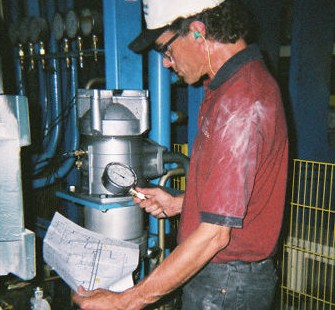
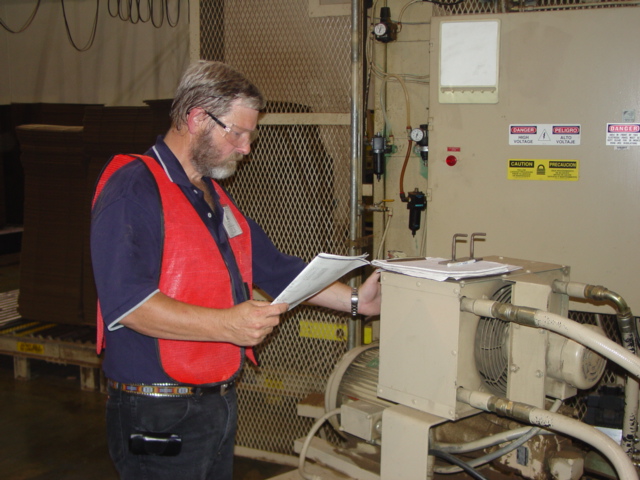
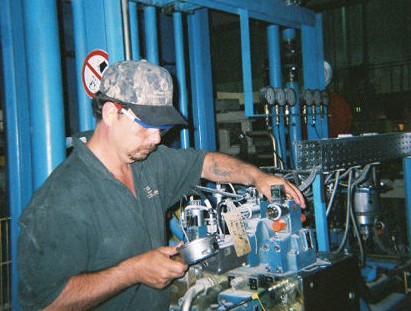
Nothing is more expensive than unscheduled down time. GPMís customers know they can call whenever they have a troubleshooting issue they simply canít resolve. With over 50 years experience dealing with hydraulic failures, our consultants have the resources to help troubleshoot whatever hydraulic problem you encounter. Whether youíre experiencing a total system outage, repeated component failure or just need a professionally designed preventive maintenance schedule, the consultants at GPM can help. Call GPM for
In-plant Troubleshooting
Leakage Problems
Pressure Settings
Shock Problems
Preventive
Maintenance Scheduling
Hydraulic Troubleshooting Manual Development
Startup
Consulting and Recommendations
Heat
Problems
Repeated
Component Failures
Speed Problems
Do you want to learn more about how GPM can help you? Go to http://gpmhydraulic.com/troubleshooting.htm

Maintenance Basic Hydraulic Troubleshooting
2009
3 Day Workshop
Registration
Fee Only $895.00 Per Person
Three for the Price of TWO!
Every Third Registrant Attends for FREE!
Early Registration -
$845.00 For Confirmed Reservations
Booked 21 Days Prior to the Start of the Workshop
Call (770) 267-3787 To Register
Learn More About Our Maintenance Basic Hydraulic Troubleshooting Course
2009 Maintenance Basic Hydraulic Troubleshooting Schedule
Date
(Our mobile lab will not be available for this program - display pumps and valves will be used for learning purposes)
(Our mobile lab will not be available for this program - display pumps and valves will be used for learning purposes)
*Don't see your city listed? Call If You Would Like To See A Workshop Scheduled In Your Area!
(770) 267-3787
|
|
||||||||||||
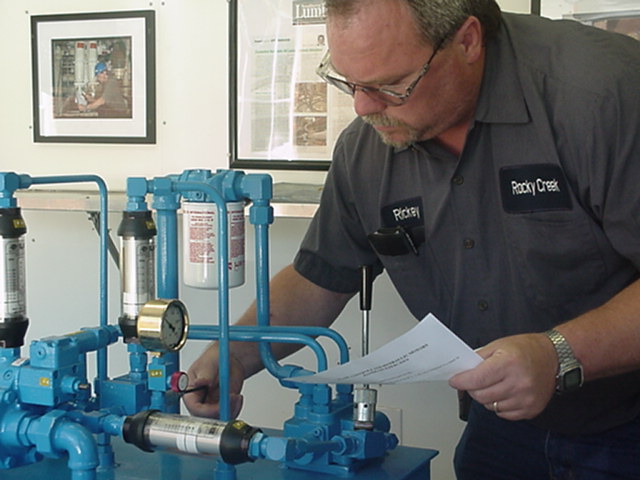
|
Hydraulic pumps and accumulators are the two components that determine how fast your machine operates. When a hydraulic problem occurs the pump is usually the first component that is changed. Since it is usually the most expensive and time consuming part to change out, it should NEVER be changed unless specific checks are made to verify that the pump is bad. The accumulator is the most dangerous hydraulic device. Prior to working on or around the machine you MUST verify that the pressurized fluid in the accumulator is at 0 PSI. Failure to do this can result in injury or death! What You Will Learn in This Hands On Workshop
Call, fax or email today to register for
this money saving and safety awareness enhancing workshop!
(770) 267-3787 Phone (770) 267-3786 Fax gpm@gpmhydraulic.com Registration Fee - $295
|
|||||||||||
If you've found our newsletter informative and beneficial please click here to tell your co-workers and friends.
A step-by-step guide for changing cylinder seals and carrying out minor repair. The manual contains disassembly, inspection of parts, minor repair, assembly, examples of seal failures and their causes, hydraulic cylinder speeds, metric/inch conversion table, fluid power formulas, rod and piston groove diameters.
$24.99 + Shipping & Handling
Site Index
[Home] [Our Training] [Hydraulic Consulting] [Safety Webinars] [System Flushing] [Our People] [Downloads and Multimedia] [Testimonials] [Hydraulics Quiz] [GPM Store] [Upcoming Events] [Contact Us]
GPM Hydraulic Consulting,
Inc.
Box 1376
Monroe, GA 30655
(770) 267-3787




